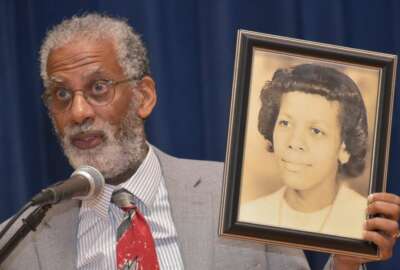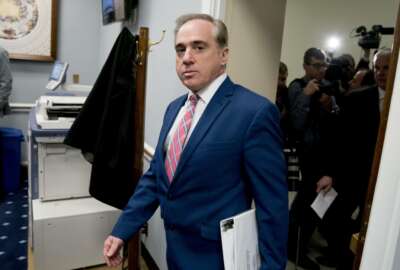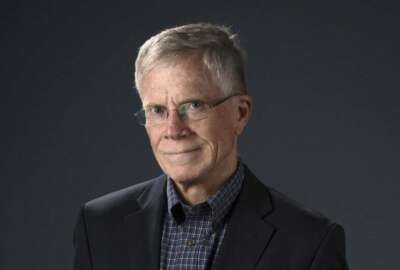
New book details groundwork of Cold War-era CIA operatives
Work at the CIA has always carried political and moral ambiguities. The groundwork can be gritty and difficult. A new book tells the stories of four early Cold...
Best listening experience is on Chrome, Firefox or Safari. Subscribe to Federal Drive’s daily audio interviews on Apple Podcasts or PodcastOne.
Work at the CIA has always carried political and moral ambiguities. The groundwork in foreign affairs can be gritty and difficult. Now a comprehensive story of four early Cold War-era American spies is brought together in a new and compelling book. “The Quiet Americans” author Scott Anderson joined Federal Drive with Tom Temin to share more.
Interview transcript:
Tom Temin: Mr. Anderson. Good to have you on.
Scott Anderson: Thank you Tom. Nice to be here.
Tom Temin: This book is a pretty gritty, detailed account of some of the foreign affairs failings and some of the horrible things that happened at the ground level that some of which has been gone over before but this is kind of a new angle on it. I want to start at the end. And for those involved in the CIA, foreign affairs, and this whole apparatus has gotten infinitely more complex in the ensuing decades. What would you say are the lessons for today’s policymakers and ground operators?
Scott Anderson: I think two things. One that was very clear in the early days of the CIA was the intense bureaucratic battles it had with other agencies in the US government, especially the FBI. And I think that rivalry, that bureaucratic tension is still very much alive. The second thing I was really struck by in looking at this early period was how completely in the blind, the CIA was about what was happening inside the Soviet Union, they literally had nobody anywhere near the position of power in the Kremlin who was passing them information and really not until the mid 1950s. And I see replication of that today around the world — I’ve also done a lot of war reporting — of how, because of security concerns, most CIA people now are confined to capitals, and embassies or CIA stations are incredibly heavily barricaded, fortified against potential terrorist attacks. So it’s how do you actually go about getting a sense of the country you’re in if you’re essentially living in a bunker? And I’ve just seen that become more and more pronounced, really, since September 11.
Tom Temin: Could it be that the modern day technological surveillance apparatus that most countries can avail themselves off makes it harder to kind of matriculate among the people than it did then?
Scott Anderson: I think absolutely. So you get some sense. I mean, with cyber spying and things, but I don’t think anything really replicates to being in the street, so to speak, of being on the ground level, and really getting a sense of what’s happening in a country. So I think that just as in the late 1940s, early 1950s, the CIA has a tendency to get completely caught out and surprised by developments that doesn’t see coming.
Tom Temin: Yes, this period covers roughly 1944 to 1956. And so you have some of the familiar characters, starting with I guess Eisenhower, the Truman era, but also Herbert Hoover, and Senator McCarthy, the Dulles brothers. Talk about almost what seems like the original sins of foreign policy that we almost live with to this day that occurred back in that early Cold War kind of gestation.
Scott Anderson: Right. One thing that really struck me and why I picked this period from 44 to 56, the closeout of World War II up to the Hungarian Revolution in 1956. FDR, before his death in April of 45, he was talking about how winning in World War II meant the end of the colonial empires, this was going to be the dismantling of the French and British empires, either causing so much anxiety and disruption in the developing world, and that America was going to be this herald of democracy, it’s gonna help foster democracy around the world. And then you go 12 years later, and now the United States is actually the paymaster for maintaining the European colonial system in Asia, in Africa. And now we’re overthrowing democratic regimes in Iran and Guatemala. So there was just this incredible transformation that happened in this 12 year period. I think a lot of it was just the utter onslaught of massive cataclysmic events, which again I wasn’t fully aware of, but virtually every week, through the late 1940s, early 1950s, there was some new foreign crisis that blew up an America that was still very much in kind of an isolationist idea of itself was just kind of ill prepared to deal with. And so I think that the country or at least the administration’s, with Truman and Eisenhower, he sort of went into a defensive crouch. And it was whatever works, we just have to find our allies where we find them. And if it’s a right wing military dictator, that’s fine. So very quickly, we dispense with these kind of lofty ideals that Roosevelt had and became an imperial power on our own right.
Tom Temin: And of course, there’s a very deeply human side to all of this. You tell the story through Frank Wisner, Michael Burke, Henry North and Peter Sichel — four agents that had very different fates. Some rising pretty high and retiring relatively in good shape. One committing suicide. Just tell us the human side of those.
Scott Anderson: Yeah, all four of those men that I profile — in the 1940s, early 1950s, the CIA was, as far as agents, field agents was exclusively male. They all came out of the OSS, the Office Strategic Services, which is the American militaries wartime intelligence agency. They’d all been in that in World War II, they came out when the CIA was created in 1947. And then with the Office of Policy Coordination, which was the covert action wing of the CIA, which was created in 48, they all joined back up. And it was interesting with all four of these men is that they clearly, fervently anti communist, but actually quite socially and culturally liberal. And they very much had this idea that America was going to be this force for good around the world, and also seeing what they saw as the Soviet Union and their satellites gradually expanding around the world. So I think they all really saw this as this primal struggle between good and evil. As time went on, certainly three of them became disillusioned by it. And I think part of it was just the utter futility of a lot of the operations they were involved with. Through about the mid 1950s, there was a huge campaign to infiltrate anti communist partisans behind the Iron Curtain in all countries of Eastern Europe, and virtually everyone was an utter disaster. Almost all the men who went in were very quickly captured, most of them executed. And so this had a, I think, a huge kind of deteriorating effect on their morale. The other thing, interestingly, that I think worked on all of them was the Red Scare at home, that at the same time that they see themselves as in the vanguard of this international anti communist struggle. The CIA is being targeted by the FBI, by J. Edgar Hoover who’s funneling secret dossiers to Joe McCarthy. And so at the same time that they’re in some cases risking their lives out in the field, they’re being chipped away at at home as communist sympathizers or as pinkos. And two of the four men I write about actually came under FBI investigation as potential communist communist spies. So I think that had a huge demoralizing effect on them.
Tom Temin: And there is a small point of humor in one of them, I guess it was Henry North’s family was connected to the Ringling Brothers circus. And when he decided to throw in the towel and discussed one of your other characters, Michael Burke went to work for the circus.
Scott Anderson: That’s right. And there’s a funny line where he said, Michael Burke said I don’t know anything about running a circus. And Henry North said, oh yes you do, you’ve been training for this your entire life, you just didn’t know it.
Tom Temin: And then went on to a checkered sports management career too I guess.
Scott Anderson: I live in New York. And Michael Burke became the president of Madison Square Garden and the president of the New York Yankees. And every sports teams as Burke entered the picture, with the Yankees, with the Rangers in the Knicks, they immediately went on massive losing streak. So among New York sports fans, Michael Burke is kind of remembered as the angel of death.
Tom Temin: Yeah, so getting back to the original point, I guess maybe the lessons for today’s leaders is to have some deference to the people that are carrying out your work, having the people you can have faith in and then have faith in them. And some degree of coordination between Congress and the federal bureaucracy.
Scott Anderson: That’s right. The basic contradiction, dichotomy within the agency that’s been there since the very beginning, and no one’s really figured this out, is how you combine a covert action, kind of a proactive wing of an agency with the kind of analytical intelligence gathering of people just gathering information. It’s two very different types of people. And this has been the basic kind of split personality that the agencies always had, and no one’s ever really kind of figured it out. And it’s interesting, it’s very different in most European intelligence agencies, that these two components are almost always completely separate from one another. And it’s never been that way with the CIA.
Tom Temin: Any reaction so far from anyone that whose name you can’t name or do you think from within?
Scott Anderson: Thus far, it’s actually been very positive, somewhat to my surprise. I’m pretty critical of a lot of the operations that the agency undertook at the time. Interestingly, one of the four men I write about, Peter Sichel is still alive. He just turned 98. I had a bunch of interviews with him over the course of working on the book. And again, it’s not an unvarnished look at his own actions when he was with the agency. But he loves the book. I think he just has the kind of intellectual honesty where he recognizes that it wasn’t all this rosy image and he recognizes the mistakes he made along the way.
Tom Temin: And the final question just on a detail here, since I guess about maybe the late Nixon administration, I can’t remember, there has been a steady statutory declassification of documents from that era. And every year NARA declassifies another hundred thousand pages or whatever it is. Did that effort help in your research?
Scott Anderson: It’s a great question and it did somewhat. But I have to say the vast majority of documents that were helpful to me and looking at this period actually came out from the release of documents related to the JFK assassination and to the Church Committee hearings in 1975. What I’ve found, and I’m certainly not the first researcher or historian to bring this out, is that especially since September 11, the government has this tendency to to slap confidential, important to national security censorship on virtually everything. So it’s become increasingly more difficult to gather material. That said, Americans tend to be pretty sloppy sensors. So it’s often possible to triangulate information. For example, if two men were at a top secret meeting in 1953, and they both wrote memorandums about it, one might be very heavily censored so that you can’t really make any sense of it, but another one will be very lightly censored. So you can kind of triangulate in a lot of cases of what went on.
Tom Temin: Scott Anderson is the author of, what I think is a really good read, The Quiet Americans published by Doubleday. Thanks so much for joining me.
Scott Anderson: Thank you, Tom. Thanks for having me.
Copyright © 2025 Federal News Network. All rights reserved. This website is not intended for users located within the European Economic Area.
Tom Temin is host of the Federal Drive and has been providing insight on federal technology and management issues for more than 30 years.
Follow @tteminWFED
Related Stories

Former VA secretary Shulkin talks new book, career and his thoughts on public service




